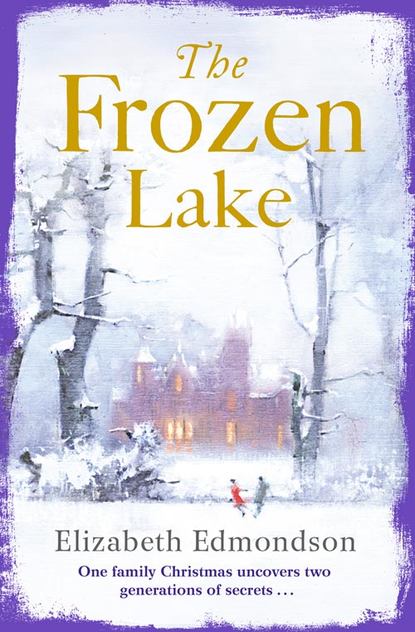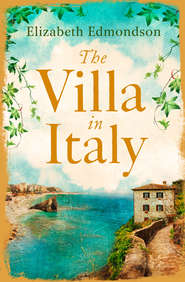По всем вопросам обращайтесь на: info@litportal.ru
(©) 2003-2024.
✖
The Frozen Lake: A gripping novel of family and wartime secrets
Настройки чтения
Размер шрифта
Высота строк
Поля
It was all too true, but the damage was done, and for all the next year she would be the despair of her mother, rejecting as soppy and stupid all the desirable young men paraded for her approval and finally making a most inappropriate match with a rising but none-too-young Labour politician – ‘of all dreadful people, my dear!’ – who had something of the same quicksilver mind and natural ease of authority that she had fallen for in the enigmatic Mr Grindley.
The colonial bishop seated opposite asked Hal where he would be going when they landed in England.
‘To Westmoreland,’ he replied without any hesitation. Where the lakes were freezing, and where he had family.
He didn’t add that visiting his family hadn’t been any part of his original plan, but the story in the newspapers brought on board when the ship called at Gibraltar had brought back a longing for his native hills that overwhelmed him. He had sent telegrams and retired to his cabin with a head suddenly alive with memories of childhood winters beside the lake and among the great fells, of skating in clear bright air, of toboggans and yachts and hot pies eaten with cold fingers on the ice, and Nanny scolding when he came in freezing and hungry and exhausted, ready to sleep for twelve hours and then to be back on the ice, sliding and tumbling among his friends.
He could see Grindley Hall in his mind’s eye; would Peter have made many changes? What about Peter’s new wife? She sounded uninteresting, certainly a comedown after funny, vital Delia whom he had adored, and who had run away from Peter one summer’s night with a Scottish poet. She had paid a high price for her new life in a Highland castle, since Peter had vented his hurt rage in a refusal to allow her any contact with her children. She kept in touch with them, he knew, only by clandestine means, writing to Nanny at a separate address from the Hall.
Hal didn’t blame her. He’d run away himself, to all intents and purposes. Less scandalously, but almost as effectively. Like Delia, Hal had sought refuge from his family among Bohemians and artists, only in his case, he knew that those he had abandoned felt nothing but relief at his absence. He was a changeling among the Grindleys, sharing neither of the family’s absorbing interests of killing things and making money.
After a dinner that had run to its usual five courses, despite the raging sea, he and the bishop took refuge from her ladyship in the Smoking Room, a place too masculine for even one of her assurance to enter. There, amid the satisfactory aroma of good cigars and leather chairs, they sat companionably enough, the bishop drinking whisky and Hal with a glass of bourbon at his elbow.
Talk of the frozen north led the bishop to turn the subject to the one great passion of his life: fishing. Fly fishing in particular, and he settled down to indulge in a long drone about casts and flies and pools in obscure places and long-lost fishy prey that had got away.
Hal found listening to this saga quite restful, having grown up surrounded by guns and rods, and by material evidence of the Grindley obsession in the shape of such delights as an enormous salmon mounted in a glass case, set among bright green reeds, with a placard beneath it announcing that it had been caught by Gertrude Grindley in 1898.
This particular trophy had for some reason ended up in his bedroom, where it at first gave him nightmares and then simply joined the list of things he disliked about his home. He marginally preferred the fish to the antlered heads with their sad eyes, and the stuffed stoats, weasels and foxes that some taxidermy-mad ancestor had collected so avidly and which stood around on side-tables and on shelves in every room of the house.
His attention was jerked back to what the bishop was saying by the alarming words, ‘and of course, I used to go fishing there with your uncle, Robert Grindley. Dead now, I heard.’
‘Uncle?’
‘You’re old Nicholas Grindley’s boy, aren’t you? He’s dead, too, of course, none of that generation left except a sister, that’ll be your Aunt Daphne. You must be Peter’s youngest brother. I was at school with Peter, he fagged for me one year. We called him Jakes. On account of the family business, you know.’
‘Ah, yes.’ Hal could remember all too well his own school soubriquets of Jeyes, and Clean-round-the-bend. Roger had been called Flush, he recalled, which never seemed to bother him.
‘How is Peter? Keeping well? I heard about his wife; shocking business, shocking. He’s married again, though.’
‘Yes. I rarely see him, living abroad as I do.’
‘Yes, yes, you always were the odd one out.’
Hal was feeling some alarm. ‘I’d rather you didn’t mention that you know my family. To Lady Gutteridge. I mean …’
The bishop shook with laughter. ‘No, no, I saw right from the start that it would never do, and I have no desire to make mischief. Mind you, Grindley Hall is all very well, but I should think she has ambitions beyond the younger son of a northern squire, if you don’t mind my saying so.’
‘Oh, just so. However, with that kind of woman, one can’t be too careful.’
‘No, indeed, indeed. You can rely on me. Yes, Peter Grindley, how that takes me back. I remember one year, we’d taken a couple of rods up Loweswater way …’
Hal was beginning to regret that the bishop had caught whatever tropical disease it was that left him so thin and yellow and apparently unable to continue with his ministry overseas. Not that the bishop seemed to mind. As he turned his episcopal thoughts from past fish to watery pleasures yet to come, the sense of boredom that Hal had so often experienced when with his family and their friends began to get the better of his good nature and manners. He rose to his feet. ‘I think I’ll turn in,’ he said, stretching out a hand to steady himself as the ship hurtled down into an extra deep wave.
‘Quite so,’ said the colonial bishop, his mind full of whisky fumes and fishy foes.
It was bitterly cold, the day the ship docked at Tilbury, and he bid the bishop goodbye at the Customs Shed. The bishop was heading for a cathedral town in the West Country; Hal was spending the night in his club in London. He would devote the next day to professional and business affairs, and then catch the night sleeper to the north, and the frozen lake.
FIVE (#ulink_19209c91-35b2-5cf6-8cde-afc9904533c4)
Yorkshire
Perdita Richardson hadn’t expected a letter from her best friend Ursula Grindley, not so near the end of term. Yet there it was, tucked into a tattered old copy of the Couperin Suites by an obliging and well-bribed school maid.
Letters at Yorkshire Ladies College, where Perdita was a boarder, were considered dangerous items and reading an illicit letter was almost as much of a problem as receiving it, for the young ladies were constantly watched. Twenty seconds in a practice room without playing a note and a teacher would be at the door wanting to know why you were slacking. Hawk eyes bored into you in the library, as you went along the corridor, in the dining room; spies were everywhere in dormitories and common room. The lavatory was a possibility, but there were set times for that, and usually a queue outside the door.
Perdita broke into a ripple of arpeggios with her left hand while she tucked the letter into her liberty bodice with her right hand. Later, she would contrive to slip it inside her sock, and then, in the afternoon, she would work the frayed lace trick.
‘I don’t know what it is with you and bootlaces, Perdita Richardson. Yours are always breaking.’ The brick-faced games mistress suspected a ruse, but couldn’t deny that there was the lace in two pieces, and, on inspection, it had suffered what appeared to be a natural breakage with appropriate fraying.
‘I think it’s because my hockey boots are too small for me,’ said Perdita helpfully. ‘It must put a strain on the laces.’
‘See you are supplied with a new pair of boots for next term. Go and put in a spare lace. Be back in five minutes.’
She could stretch that to seven or eight, Perdita thought as she jogged back to the changing rooms. Once there, she tugged off the offending boot, one she’d taken from the lost property box, and pulled on her own boot with its perfectly good lace. Then she sat down on the wooden lockers, plucked the letter from its hiding place in her sock and began to read.
It started without any preamble – a precaution in case it should fall into hostile hands.
Very near the end of term, I know, but I had to write to tell you all the news as there’s a terrific to-do going on here. The chief reason is that the family Black Sheep will shortly be with us – in case you don’t know who that is, it’s my Uncle Hal. You never met him – nor did I, or if I did I was a mere puling infant & don’t remember it – because he went off years and years ago, to America! Yes, that one!
Well, the fuss, you’d think some arch-criminal was on his way. And the point is, I can’t find out that he ever actually did anything very terrible, except to take up acting when he was at Cambridge and then head for London to Go On The Stage! That was before he went to America. I mean, what’s so shocking about an actor, only you know what Daddy’s like, he shouts and rants about ‘Those Sort of People’? He says actors are a bunch of Pansies and then goes red if he thinks I’ve heard – he imagines I don’t know what he means. Musicians and painters are Pansies, too, of course – if they’re men. If they’re women, they’re badly brought up with no allure and probably thick ankles who should have been controlled by their fathers. He doesn’t get any less Victorian as he gets older. He should control his temper, never mind his daughter – all that going red can’t be doing him any good at all.
I asked Nanny to tell me about Hal. She has a soft spot for him, you can tell that at once. She let out that his brothers called him the Afterthought, because he’s so much younger than they are. He’s thirty-eight, she says, and Pa’s fifty-five, and Uncle Roger fifty-two, so it’s quite a gap, I do see. Grandma must have been awfully old to have a baby when he was born. One thing is, he didn’t come back from America when Grandma died, and that’s held against him, BUT, Nanny says that Daddy didn’t send the cablegram until he knew it was too late for him to get here for the funeral.
It isn’t only the acting that’s causing all the agitation. It’s money. Isn’t that always the way with my family? Hal got a third of the business when Grandpa died, and that still rankles with Daddy – considering he got the house as well as shares and so on, I don’t think he’s being very fair. Anyhow, they reckoned that being an actor and no good at it – well, no one’s ever heard of him, have they? – he’d have sold his shares, spent the money and be living in penury. Only he hasn’t, they’re all still in his name. There’s some deal brewing, and they need his shares to put it all through. Hence the flap – will he be difficult about it?
The Grindleys are gathering. Uncle Roger and Aunt Angela have arrived, with Cecy. Uncle Roger’s still being beastly about her training to be a doctor. Aunt Angela says Hal is a nice man, only not in the least interested in sport and shooting and all that. He was clever, too, and you know how suspicious Daddy is of anyone clever, books and plays and things all being a waste of time and not in the real world, meaning lav pans and baths. You don’t know how lucky you are that your family’s money comes from dull old engineering works and not from sanitary chinaware. Nicky knocked a boy down this term because he got so fed up with remarks about things going down the pan. He’s at home, therefore, in disgrace, but he doesn’t care a bit; he hates school.
Anyhow, that’s not all. Exquisite Eve (my new name for my awful stepmother, don’t you like it?) has set her mind against Hal, don’t ask me why, and says he shouldn’t have just announced he was coming but should have waited to be invited. He’d have had to wait a jolly long time in that case. Aunt Angela says, ‘Rot, it’s his home,’ or words to that effect, but Eve isn’t pleased. Then a cable came from Lisbon mentioning the name of his ship, the SS Gloriana. When Uncle Roger heard that, he cried out, ‘That’s not on the Atlantic run, it’s a P&O vessel and goes to and from India and Australia.’ So that’s got them even more worked up, did he get the letters about the shares that they sent to New York, and what on earth could he be doing in Australia and India? As if no one ever went there before, which of course they do, all the time.
My stepsister Rosalind will be turning up from her finishing school in Munich. You haven’t met her, but I’ve told you how ghastly she is – well, she would be, with exquisite Eve for a mother. Daddy thinks she’s wonderful, he goes on and on about her poise and beautiful manners and grooming – you’d think she was a horse. Only she isn’t, she’s frightfully pretty in a boring, brittle sort of way, and very affected. She behaves as though the Hall is a leftover from the Middle Ages (she’s got a point there), and treats me like I was some kind of a peasant. Simon can’t take his eyes off her, I never saw anything so soppy, and he won’t hear a word against her. He’s home from Cambridge, and gloomy as usual, he knows that Daddy won’t hear of him joining the army after university; the eldest son has to go into the business, and that’s that. Honestly, my brothers, what a pair, but at least Nicky isn’t at all struck by the fair Rosalind. Just wait till you see her.
Must finish, or there’ll be so many pages you won’t be able to flush them down the lav, hope it’s a Jowetts, we need to keep the money coming in to pay for Rosalind’s expensive clothes and Eve’s beauty treatments. Oh, and guess what, we’re going to have a dance over Christmas, hooray, but it’s in honour of Rosalind’s seventeenth birthday. It makes me sick. Catch Daddy ever giving a dance in my honour.
Can’t wait to see you and have a really good talk about it all, xxx
PS Cecy says she’s been trying to persuade E’s twin (better not mention her name) to come back for Christmas. I hope she does.
SIX (#ulink_5c14e7d6-24ef-55df-a1da-1dce68bb8c82)
London, Bloomsbury
Edwin had met Lidia on the steps of the Photographic Institute in London. To be exact, he had tripped over her; she had been on her knees, scrubbing, and he hadn’t been looking where he was going.
‘Blöder Idiot,’ she exclaimed.
‘Oh, Entschuldigung, ich habe Sie nicht gesehen,’ he replied, startled. ‘I’ve knocked over your bucket,’ he continued in English.
‘It is nothing,’ she muttered, getting to her feet and wiping her hands on her worn crossover apron. Why was the man staring at her like that?









